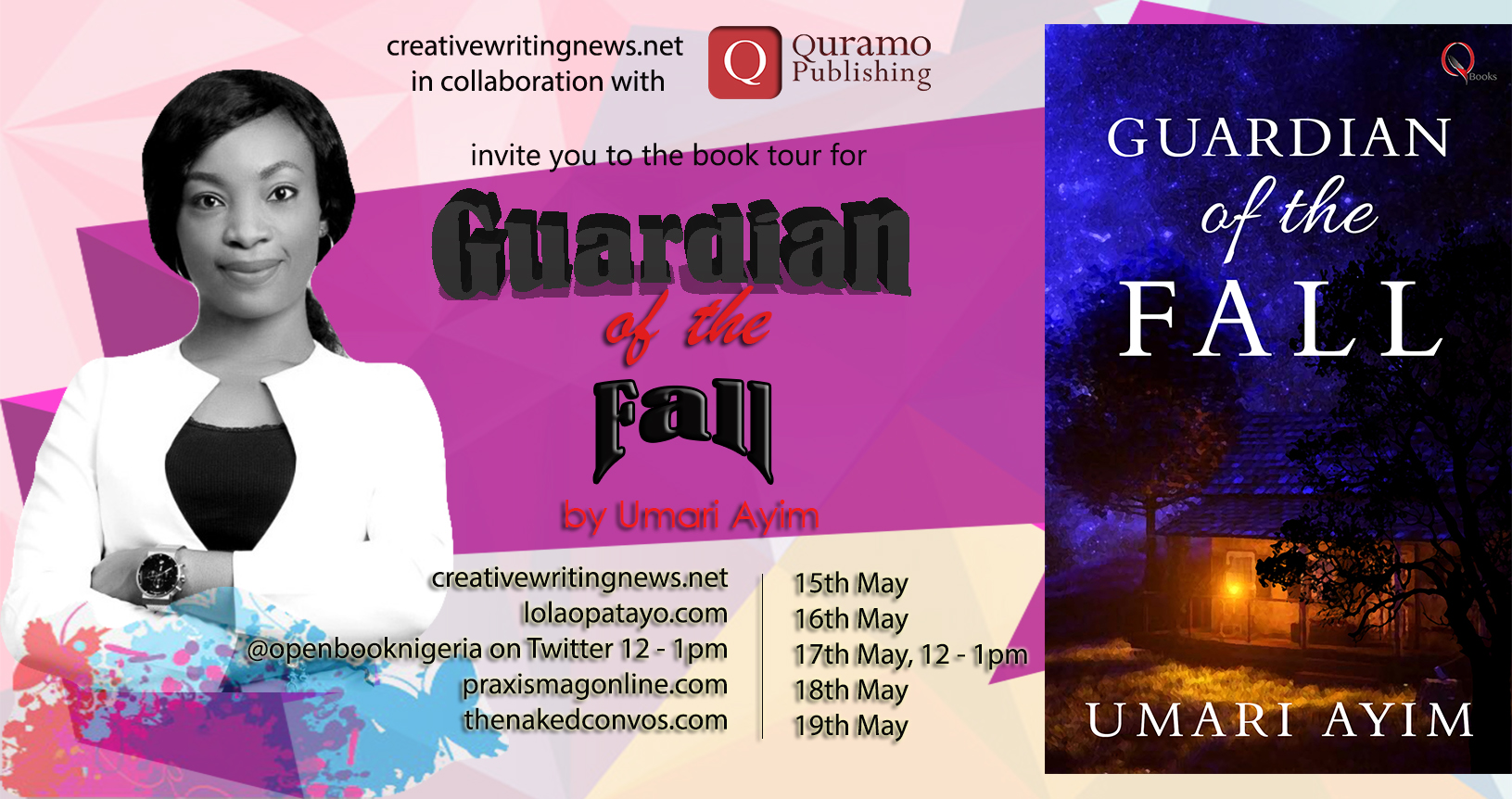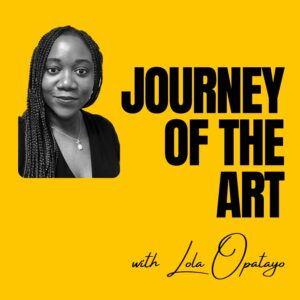Welcome to the book tour of Umari Ayim’s Guardian of the Fall. It began yesterday on Creative Writing News and today LolaOpatayo.com is priviledged to host this intriguing writer and her work. I encourage you to participate by asking questions and also join the tour on Open Book Nigeria tomorrow, this will increase your chances to win a free copy of the book.
What is Guardian of the Fall About?
 As I said yesterday, the book is an exciting mix of mysticism, romance, and suspense. The story is spun around the Guardian, the eponymous character, and keeper of a picturesque forest and waterfall in Agbokim village, in Cross River State, Nigeria. The Guardian is a force, a deity of some sort, which exhibits formidable powers, including shape shifting (appearing as a child, an old woman, an owl, a snake, a satyr-like creature, and a goat with a baby’s face). It attempts to match make its messenger, Erom, with Ken, a developer who wants to build a resort near the falls. Erom, with no say in the matter, is chosen, as a messenger of the Guardian; Ken’s parents decide his profession, university, where he’ll work and even the day he should start work; and the Guardian, through dreams and visions, essentially pulls Erom and Ken together, which, upon introspection, asks the philosophical question – how real and true is human love if it is predestined and fated by the gods? I particularly enjoyed the author’s style of writing and found her descriptions vivid. I have quite a lot of questions for her, but first, here’s an excerpt from page 58 of the book.
As I said yesterday, the book is an exciting mix of mysticism, romance, and suspense. The story is spun around the Guardian, the eponymous character, and keeper of a picturesque forest and waterfall in Agbokim village, in Cross River State, Nigeria. The Guardian is a force, a deity of some sort, which exhibits formidable powers, including shape shifting (appearing as a child, an old woman, an owl, a snake, a satyr-like creature, and a goat with a baby’s face). It attempts to match make its messenger, Erom, with Ken, a developer who wants to build a resort near the falls. Erom, with no say in the matter, is chosen, as a messenger of the Guardian; Ken’s parents decide his profession, university, where he’ll work and even the day he should start work; and the Guardian, through dreams and visions, essentially pulls Erom and Ken together, which, upon introspection, asks the philosophical question – how real and true is human love if it is predestined and fated by the gods? I particularly enjoyed the author’s style of writing and found her descriptions vivid. I have quite a lot of questions for her, but first, here’s an excerpt from page 58 of the book.
Erom climbed off the bus and stretched her stiff muscles. She felt like she had been traveling for a whole day, instead of the three hours it had taken her. The ground was soggy with small circles of muddy water everywhere. Erom looked down with annoyance at the thin line of mud clinging to the hem of her blue trouser. Plucking a tissue from her handbag, she brushed hard at the hem for several minutes. She stopped when her anxious ministrations seemed to produce no result and flicked the tissue into the open mouth of the small green bin in the bus. She walked a few feet from the bus, feeling her confidence return with every step she took. The headscarves that kept her hair hidden had been abandoned in the village, her long hair swept back and held fast at the nape of her neck with a black velvet band. The last time she checked her reflection in the small handheld mirror in her bag, she had been satisfied with the full eyebrows that arched naturally and the pale pink eye shadow on her eyelid. She knew her eyes were brightened with the black of the kohl she had applied and her lips shone with the lip-gloss she carried around with her.
Umari Ayim is a lawyer, writer and poet. Umari has always had a passion for writing since she was a little girl  living in the bustling city of Lagos. As a member of the Literary and Debating Society of her secondary school, Umari served as the director of poetry and also wrote stage plays for the society. Her first book, a novel, ‘Twilight at Terracotta Indigo’ won the ANA/NDDC Flora Nwapa Prize for Women Writing in 2011. Her second book, a collection of poems titled ‘Inside My Head’ won the ANA Poetry Prize the following year in 2012. As a social commentator and gender activist, Umari has also published several articles published in both traditional and online media platforms.
living in the bustling city of Lagos. As a member of the Literary and Debating Society of her secondary school, Umari served as the director of poetry and also wrote stage plays for the society. Her first book, a novel, ‘Twilight at Terracotta Indigo’ won the ANA/NDDC Flora Nwapa Prize for Women Writing in 2011. Her second book, a collection of poems titled ‘Inside My Head’ won the ANA Poetry Prize the following year in 2012. As a social commentator and gender activist, Umari has also published several articles published in both traditional and online media platforms.
And Here’s Another Excerpt
Umari Ayim is an award-winning writer with a respectable body of work both in prose and poetry. Guardian of the Fall stubbornly refuses to fit into the genre box. Favourite line? When the Guardian tells Erom, “…Not all questions in life will be answered”. Favourite scene? The haunting one involving the murder-sacrifice of a child: for some inexplicable reason, it reminded me of the death of Ikemefuna in Things fall Apart.
– Chiemeka Garricks, author of Tomorrow Died Yesterday
The Guardian of The Fall is a beautiful blend of African myth and fantasy colliding with the modern world”. Umari Ayim awakens our five senses in the pages of his book; her words make you see, smell, hear, taste and touch the elements of the pages. She paints a beautiful image of nature encompassed by mystery and takes us an extraordinary adventure through the forests of Cross River.
– Princess Abumere, Founder, The Sunshine Book Club
You Can Get Your Own Copy of the Book Here
Quramo Publishing Limited Office
The Simi Johnson Centre, 13 Sinari Daranijo Victoria Island Lagos
+234 (0) 909 174 0210, +234 (0)1 454 7878
Jazzhole
168 Awolowo Way, Ikoyi, Lagos, Nigeria
+234 (0) 803 332 0398
Patabah Books
Shop B18, Adeniran Ogunsanya Shopping mall, Adeniran Ogunsanya Street,
Surulere, Lagos, Nigeria.
+234 (0) 709 048 5129, +234 (0) 1 730 7640.
Quintessence Limited
Plot 13, Block 44, Park View Estate Entrance, Off Gerrard Road, Ikoyi Lagos,
Nigeria. +234 (0) 802 699 2535
Salamander Café Limited
5 Bujumbura Street, Off Libreville Street, Off Aminu Kano Crescent, Wuse 2
Abuja, Nigeria.
+234 (0) 809 220 4424, +234 (0) 809 220 4424
Roving Heights Books Nigeria
+234 (0) 703 203 8633, +234 (0) 909 215 8968
Do you have a question you’d like to ask the author? Please do so in the comment section, and she’ll respond. Welcome Umari!



Hello Umari, thank you for joining us today. I thoroughly enjoyed your book. I think i’d like to start with the first thing that struck me about it. it’s the pressure on Ken to marry. We don’t see a lot of this, especially with young men, the African culture particularly puts pressure on women to marry and procreate, but here we see Ken in exactly the same shoes. Erom on the other hand, has no pressure whatsoever from her parents to marry. Was this a deliberate upsetting of the stereotype?
Hello Lola, thanks for your question. Yes, it was deliberate. Writing Guardian of the Fall was an opportunity for me to question this stereotype and every other stereotype concerning the roles of women in the society. By putting the shoe on the other foot in this instance and many other instances in the book, I try to challenge antiquated or set notions about the functions of the two sexes in society.
Good morning Umari, thanks for being here. I have read some of your work and I loooovee them. I wanted to know if this is in any way similar to Born Again.
Thank you Nnenna for joining us, Umari will respond to you shortly.
Thanks for your question Nnenna. Glad you have read my previous works. And no, this story is different from Born Again because the latter focuses on reincarnation, love and second chances while Guardian of the Fall discusses a range of subjects including tradition, identity, creationism, corruption, environmental degradation, love and sexuality.
How do you get this mystic ideas. Sometimes it just feels real. Is it
I was also going to ask what inspired the mystical theme of your work? Do you believe that there are forces guiding human choices?
As stated in my answer to Nnenna, I like to ponder on the subject of the supernatural and all other matters relating to it. This inspires many of my works. As for the second question, it is a tricky one because I believe that man is wholly responsible for whatever action s/he takes but I also hold the belief that man has a divine nature and is a force, so his actions are inspired by the divine. So yes, there are ‘forces’ guiding human choices.
I have always been intrigued by the supernatural, religion and many questions left unanswered by science. My ideas come from ruminating on these subjects in my quiet time. On whether they are real, I like to feel that they are.
I also noticed the theme of what I’d like to call Parental Expectations. We see this with Ken and his parents, Erom and her mother (in fact her family), Jata and her mother and with Ofem and his father. You show how the characters are greatly affected by the expectations of their parents and how this forces them to make significant choices. Is this something you really wanted to make a statement about? Did your emphasis of this theme stem from a personal experience?
Yes, this is something I wanted to discuss. Many children are forced to live the dreams of their parents instead of their own dreams. This is can cause children to feel unduely pressured to take decisions that leave them unfulfilled.
Well, my emphasis did not stem from a personal experience as I was allowed to pursue my dreams even as a young child but very few parents allow this, especially in the traditional African setting. I felt compelled to discuss the issue because of this.
I agree this is an issue, and one of the reasons why I like the fact that you explored this subject is the problem of identity crises that these characters eventually had to deal with. Somehow, because of the influence of their parents, all of them struggled with who they truly were and who they were expected to be. On the flip side though, we see how especially with Erom and Ken, the influence or wisdom of their parents helped them to find their true identity. Erom’s mother tells her that “there will be questions in life that will never be answered” and that she will find her “answers one day just as i found mine”. I found this interesting, you seemed to want to strike a balance in accepting parental guidance.
Thanks so much, Umari